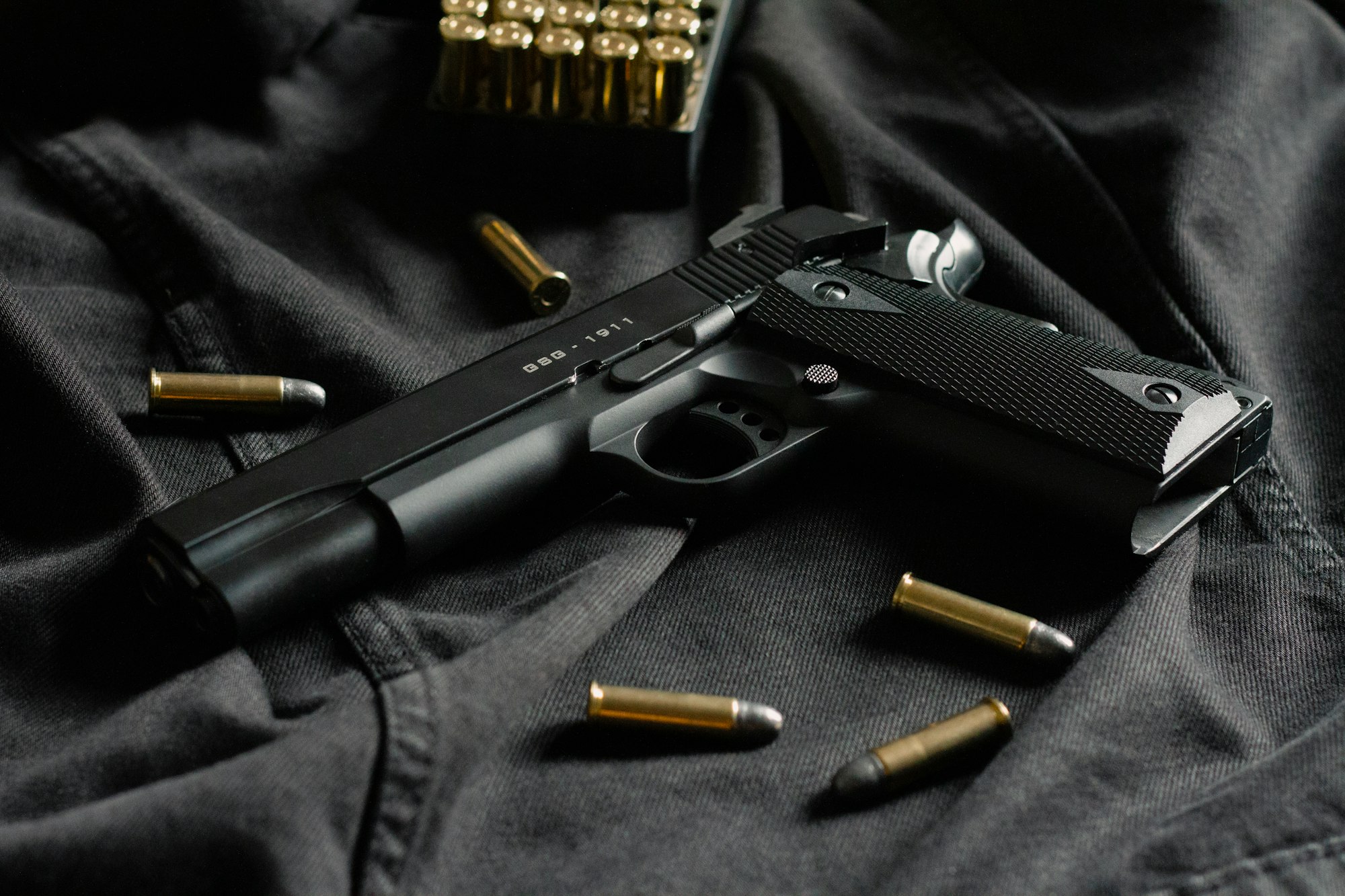Vorsicht, politisch. 🧵
— Torsten Heinrich (@Inclutus) March 10, 2023
Das grundsätzliche Dilemma bleibt bei Schusswaffen:
1. Der Staat ist und bleibt der größte Mörder, nicht der private Waffenbesitzer.
2. Der Staat hat im 20. Jahrhundert mindestens (!) 200.000.000 Menschen ermordet.
1/
TL;DR?
- For self-defense: Firearms are often considered an effective means of personal safety and self-defense. Individuals can effectively protect themselves in the event of an immediate attack.
- To deter crime: The presence of legal gun owners can serve as a deterrent to potential criminals. The awareness that potential victims might be armed could help reduce criminal activities.
- For protection against tyranny: Individual gun ownership is historically a means of protection against government tyranny. People should have the means to defend themselves against an oppressive government when necessary.
- For emergency preparedness: In emergencies such as natural disasters or social unrest, firearms could serve as a means of self-defense and property protection when fellow citizens begin to turn violent.
- For equality: Firearms are considered the "great equalizer" as they give people the ability to defend themselves regardless of physical strength. This is often emphasized, especially in the context of women.
- For individual freedom: Individual gun ownership is seen as an expression of individual freedom and autonomy. People have the right to ensure their safety and freedom without relying solely on state institutions.
The fundamental dilemma in dealing with firearms becomes particularly evident when considering historical backgrounds
The fundamental dilemma in dealing with firearms becomes particularly evident when considering historical backgrounds: In the 20th century, at least 187 million people worldwide were murdered by the state. This staggering number underscores that the state itself is the major perpetrator of violent crimes, not private gun owners. [1]
At the same time, the highest estimate for "civilian" murders for the same period is pegged at 50 million. However, these estimates vary depending on the source and research methodology. Some studies are based on a complex analysis of crime data and population statistics, while others may rely on assumptions and approximations. It is important to note that the research community is divided on the exact number of civilian deaths related to firearms, and the debate over the methods for calculating these figures continues. Against this backdrop, Germans, in particular, should have a healthy skepticism about the idea that "weapons should only be in state hands." German history shows that the state has not always acted kindly towards the population.
A responsible legal gun owner certainly does not want firearms to end up in the hands of criminals or the mentally ill. However, if state regulation becomes too restrictive, problematic consequences arise. People who do not want to lose their right to firearms might even avoid medical treatment. That means someone who "hears voices" and fears that this could affect their right to own firearms might simply not seek treatment to retain the privilege of carrying weapons. A "ban on firearms in the hands of the mentally ill" paradoxically leads to less treatment for the mentally ill, with catastrophic consequences. In this context, concerns about state interventions and regulations regarding private gun ownership become particularly relevant and understandable. It highlights the complexity of the issue and the potential impact on individual freedoms and societal developments.
Red Flag Laws
"Red Flag" laws are also not a solution as they encourage state abuse. In some US jurisdictions, the confiscation rate is purported to be 99%, which is an obvious abuse. In Germany, there are strict regulations and criteria for the acquisition and possession of firearms. A conviction for serious bodily harm usually leads to a person being classified as unreliable and thus losing the right to possess firearms. In line with legal positivism, it can be stated that the historically entrenched practice of totalitarian regimes is to label political dissidents as mentally disturbed or to convict them without justified reasons. In the context of legal positivism, it is emphasized that such actions indicate a potential instrumentalization of the law, where formal legal structures are abused to criminalize political opposition. The separation of law and morality in the legal positivist approach means that state abuse is imminent when legal norms are applied detached from ethical and democratic principles.
Concerns
Although the majority of people could handle weapons responsibly, preventing accidents, the concerns of individuals who have had no previous contact with firearms and hesitate to entrust them to their neighbors are understandable. It is important to emphasize that freedom is neither cost-free nor without risks. Especially in the 20th century, it was more likely that murders were committed not by neighbors but by the police or the military—institutions expected, according to opponents of gun ownership, to be the sole bearers of weapons. This aspect must be highlighted!
All this does not even consider the fact that the firearm is the most democratic of all means of self-defense, as it can be operated just as effectively by a 70-year-old woman as by a muscular 25-year-old man. In comparison, there is nothing that could offer a senior woman a comparable chance against a 25-year-old man. Nothing!
Not to mention that the police take many minutes when seconds are crucial. Especially in regions with high gun prevalence, such as the USA, armed civilians have successfully stopped "mass shootings" in some cases. Elijah Dickens is just an outstanding example from 2022, illustrating how armed civilians were able to intervene in such critical moments. Interestingly, some statistics only consider it a "mass shooting" when there are already 3-4 deaths—a scenario that often does not occur in the presence of armed civilians. These circumstances underscore the role of armed civilians as potential actors in preventing violent crimes in acute situations.
A more thorough analysis of the "firearm rate per capita" compared to the "murder rate" illustrates that the correlation between the two factors is not directly apparent. A particularly illustrative example is provided by the USA and Tanzania, which, despite a similar murder rate, have significantly different gun ownership rates—with 120.5 compared to 0.8 guns per 100 inhabitants. [2, 3]
Even in culturally related countries, significant deviations between the two indicators can exist without a clear correlation with the presence of firearms being discernible. A pertinent example is found in Switzerland, where private individuals can own fully automatic weapons without this leading to an increase in homicides. These detailed observations suggest that the underlying problem is more attributable to sociocultural factors and not necessarily correlated with the mere presence of firearms.
Conclusion
The issue is by no means as clear-cut and one-sided as gun opponents would like to portray it. There are indeed legitimate reasons for owning firearms, not only in the context of sports and hunting but also summarized in:
- For self-defense: Firearms are often considered an effective means of personal safety and self-defense. Individuals can effectively protect themselves in the event of an immediate attack.
- To deter crime: The presence of legal gun owners can serve as a deterrent to potential criminals. The awareness that potential victims might be armed could help reduce criminal activities.
- For protection against tyranny: Individual gun ownership is historically a means of protection against government tyranny. People should have the means to defend themselves against an oppressive government when necessary.
- For emergency preparedness: In emergencies such as natural disasters or social unrest, firearms could serve as a means of self-defense and property protection when fellow citizens begin to turn violent.
- For equality: Firearms are considered the "great equalizer" as they give people the ability to defend themselves regardless of physical strength. This is often emphasized, especially in the context of women.
- For individual freedom: Individual gun ownership is seen as an expression of individual freedom and autonomy. People have the right to ensure their safety and freedom without relying solely on state institutions.
Despite frequent trivialization, it should be emphasized: The state can indeed become a threat, and citizens facing themselves is not uncommon. The Taliban and the Vietcong were hardly better—some might even say worse—armed than the average gun enthusiast in Texas. Yet, these groups successfully defeated nuclear powers equipped with aircraft carriers, tanks, and stealth bombers. This underscores that the effectiveness of the "private AR-15 against the murderous state" is by no means entirely dismissed. A similar scenario was evident with the partisans in Ukraine who, in February 2022, opened their arsenals and armed themselves with automatic weapons to defend against the "second strongest army" in the world. [4]
The overwhelming majority of people are good and would not suddenly turn into mass murderers even upon receiving firearms. However, it should be noted that with firearms, the principle applies: "Abuse does not negate (the right) use." Therefore, the concerns of gun opponents are understandable. But especially Germans should ask themselves whether it is really a good idea if only the state is in possession of firearms. [5]
--
[1] https://de.wikipedia.org/wiki/Kriegsopfer
[2] https://en.wikipedia.org/wiki/List_of_countries_by_intentional_homicide_rate
[3] https://en.wikipedia.org/wiki/Estimated_number_of_civilian_guns_per_capita_by_country
[4] https://www.vox.com/2022/2/26/22952073/ukraine-civilian-volunteers-kyiv-war-effort
[5] youtube.com/watch?v=iaCvyMlDAnA





Related Posts
Bitcoin Conferences Are Fiat.
Feb 12, 2026
Mapping Stats on Bitcoin Professional Frontier
Jan 27, 2026
A New Era of Value, Energy, and Individual Sovereignty
Jan 03, 2026